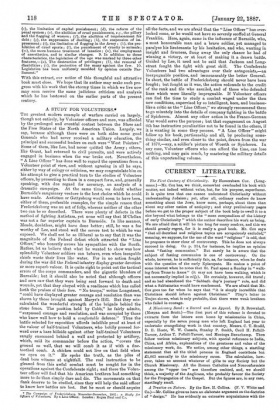A STUDY FOR VOLUNTEERS.* THE greatest modern example of warfare
carried on largely, though not entirely, by Volunteer officers and men, was afforded by the prolonged and eventful contest between the Slave and the Free States of the North American Union. Largely, we say, because although there were on both sides some good Generals who had never received a military education, the principal and successful leaders on each were "West Pointers." Some of them, like Lee, had never quitted the Army ; others, like Grant, had returned to civil pursuits, and were actively engaged in business when the war broke out. Nevertheless, "A Line Officer" has done well to regard the operations from a Volunteer point of view, and without agreeing in all he says, either by way of eulogy or criticism, we may congratulate him on his attempt to give a practical turn to the studies of Volunteer officers, by presenting to them in a compact form, and, generally speaking, with due regard for accuracy, an analysis of a dramatic campaign. At the same time, we doubt whether Burnside's sanguinary venture is the best choice which he could have made. Antietam or Gettysburg would seem to have been, either of them, preferable examples, for the simple reason that Fredericksburg was an act of folly, whereas neither of the other two can be so described. There were plenty of defects in the method of fighting Antietam, yet none will say that .111'Clellan was not a far superior captain to Burnside. In like manner, Meade, doubtless, might have done better ; still, he was a foe worthy of Lee, and stood well the severe test to which he was exposed. We shall not be so illiberal as to say that it was the magnitude of the Federal defeat which attracted the "Line Officer," who honestly avows his sympathies with the South. Rather, let us believe that what he wanted to show was how splendidly Volunteer soldiers can behave, even when incapable chiefs waste their lives like water. For in no action fought during the war did the Federal infantry display greater devotion or more superb valour. It is quite right to point out the tactical errors of the corps commanders, and the gigantic blunders of Burnside; but it should also be noted that although officers and men saw that they were being sent forward to death and wounds, yet that they obeyed with a readiness which has called forth the praises of their foes. "No troops," writes Longstreet, "could have displayed greater courage and resolution than was shown by those brought against Marye's Hill. But they mis- calculated the wonderful strength of the brigade behind the stone fence. The position held by Cobb," he fairly admits, "surpassed courage and resolution, and was occupied by those who knew well how to hold a comfortable defence." Thus the battle selected for exposition affords indelible proof at least of the valour of half-trained Volunteers, who boldly pressed for- ward over a bare hillside against other half-trained Volunteers snugly ensconced behind a wall and protected by artillery, which, said its commander before the action, "covers the ground so well, that we will comb it as if with a fine- toothed comb. A chicken could not live on that field when we open on it." He spoke the truth, as the piles of dead bore witness at nightfall. The real instruction to be gleaned from this awful combat must be sought for in the operations against the Confederate right ; and there the Volun- teer officer will find that his American brethren had something more to do than simply dare and die. The movements on that flank deserve to be studied, since they will help the said officer to know how battles are lost. Bert he must or should acquire
• The Campaign of Fredericksburg, November-December, 1862: a Study for Officers of Volunteers. By a Line Meer. London : lieges Paul and CJ. all the facts, and we are afraid that the "Line Officer" has over- looked some, or he would not have so severely scoffed at General Franklin, Here, again, came in the influence of Burnside, who, a most honourable man and a brave soldier, yet managed to- paralyse his lieutenants by his hesitation, and who, wanting in insight and firmness, flung away the only chance he had of winning a victory, or at least of making it a drawn battle. Guided by Lee, it need not be said that Jackson and Long- street fought the fight with great skill. The Confederate Volunteers had two advantages over their antagonists,—an inexpugnable position, and immeasurably the better General. In short, the battle of Fredericksburg should never have been fought; but fought as it was, the action redounds to the credit of the rank and file who assailed, and of those who defended lines whieh were literally impregnable. If Volunteer officers can find the time to study a combat waged under the then new conditions, supervised by so intelligent, keen, and, business- like a critic as the "Line Officer," we strongly recommend them to go minutely into the details of company fighting in the battle of Spicheren. Almost any other action in the Franco-German War would serve the purpose; but that engagement on August 6th has instructive peculiarities not to be found in the others, if it is wanting in some they possess. "A Line Officer" might follow up his book, partisanship and all, by producing some- thing similar, and even closer to the point, drawn from the war of 1870,—say, a soldier's picture of Woerth or Spicheren. In any case, Volunteer officers who can afford the time, can lose nothing, and may gain much, by mastering the military details of this unpretending volume.


































 Previous page
Previous page